Bring Your First AI Automation Live—In Just 7 Days! “Book Free Demo”
The Complete Google My Business Optimization Guide: How Smart Business Owners Transform Local Visibility into Revenue Growth
Master Google My Business optimization with our comprehensive 2025 guide. Proven strategies to boost local rankings, drive foot traffic, and increase revenue. Expert tips for business owners.
LOCAL BUSINESS GROWTH
34 min read
The Complete Google My Business Optimization Guide: How Smart Business Owners Transform Local Visibility into Revenue Growth

Table of Contents
Why Google My Business is Your Secret Weapon for Local Domination
The Complete GMB Setup Blueprint
Advanced Optimization Strategies That Drive Results
Google My Business Posts: Your 24/7 Marketing Machine
Review Management: Turn Customer Feedback into Growth
Google Q&A Mastery: Control Your Narrative
Local SEO Integration: Making Everything Work Together
GMB Insights: Data-Driven Decision Making
Advanced Features and Emerging Opportunities
Common Mistakes That Kill Your Local Rankings
AI-Powered GMB Automation Strategies
Industry-Specific Optimization Tactics
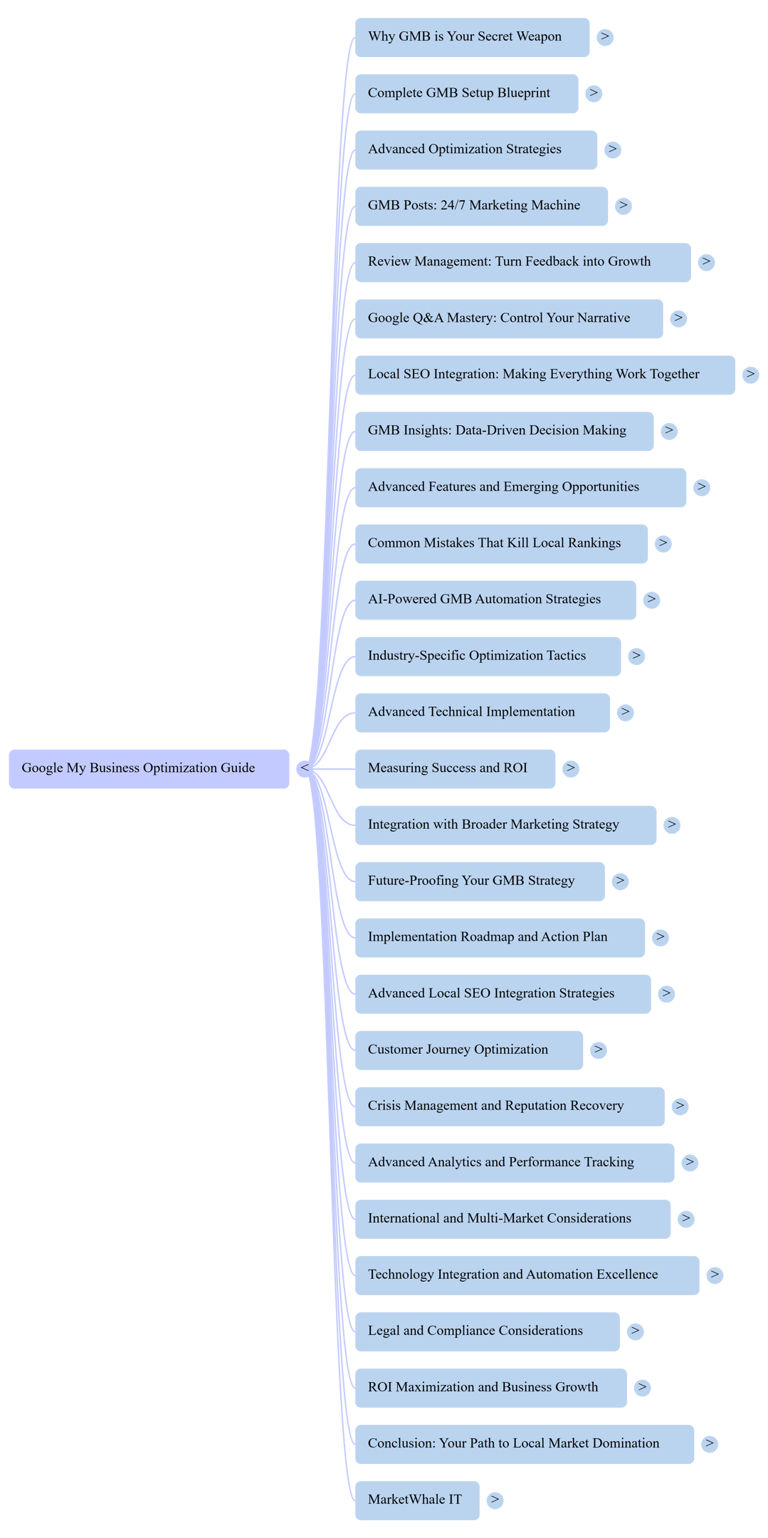

Have you ever wondered why some businesses appear at the top of Google Maps while others remain invisible to potential customers? The difference often comes down to one crucial factor: Google My Business optimization.
As someone who's helped over 150 businesses transform their local presence through AI-powered marketing solutions, I've witnessed firsthand how proper GMB optimization can be the difference between struggling to find customers and having them line up at your door.
Today's business landscape is more competitive than ever. With 97% of consumers using the internet to find local businesses and 46% of all Google searches having local intent, your Google My Business profile isn't just another marketing channel—it's your digital storefront, your reputation manager, and your customer acquisition engine all rolled into one.
But here's what most business owners don't realize: Google My Business optimization isn't just about filling out your profile and hoping for the best. It's a sophisticated system that, when properly leveraged, can drive measurable revenue growth, increase foot traffic, and position your business as the go-to choice in your local market.
In this comprehensive guide, I'll share the exact strategies and techniques that have helped our clients achieve remarkable results, including businesses that have seen 300% more leads and 65% higher conversion rates through strategic local optimization combined with AI automation.


Why Google My Business is Your Secret Weapon for Local Domination {#why-google-my-business-is-your-secret-weapon}


The Local Search Revolution
Local search has fundamentally transformed how customers discover and choose businesses. When someone searches for "best pizza near me" or "emergency plumber," Google doesn't just show a list of websites—it showcases businesses through the Google Map Pack, complete with reviews, photos, hours, and direct contact information.
This shift represents a massive opportunity for smart business owners. Unlike traditional advertising where you're competing against massive budgets, local search success depends on optimization, consistency, and customer satisfaction—factors completely within your control.
The GMB Advantage: More Than Just Visibility
Google My Business offers something that traditional marketing channels can't: immediate credibility and instant accessibility. When your GMB profile appears in local search results, you're not just getting visibility—you're getting:
Instant Trust Signals: Star ratings, review counts, and professional photos immediately communicate your business quality to potential customers.
Immediate Action Opportunities: Customers can call, get directions, visit your website, or view your menu directly from search results without visiting your website first.
Rich Information Display: Your GMB profile can showcase everything from current promotions and events to detailed service descriptions and business attributes.
Mobile-First Customer Experience: With mobile searches accounting for over 60% of local queries, GMB provides an optimized mobile experience that converts browsers into customers.
The Revenue Impact of GMB Optimization
The financial impact of proper GMB optimization extends far beyond simple visibility metrics. Our clients consistently report:
Increased Phone Calls: Businesses with optimized GMB profiles receive 30-50% more phone inquiries compared to those with basic listings.
Higher Website Traffic: A well-optimized GMB profile can drive 25-40% more qualified traffic to your website.
Improved Conversion Rates: Customers who find you through local search convert at higher rates because they're actively looking for your specific services.
Enhanced Customer Lifetime Value: Local customers discovered through GMB tend to become repeat customers and refer others more frequently.
Understanding Google's Local Search Algorithm
Google's local search algorithm considers three primary factors when determining which businesses to show in local results:
Relevance: How well your business information matches what the customer is searching for. Distance: The geographical proximity between the searcher and your business location. Prominence: How well-known and reputable your business is both online and offline.
While you can't control distance, you have complete control over relevance and significant influence over prominence through strategic optimization.
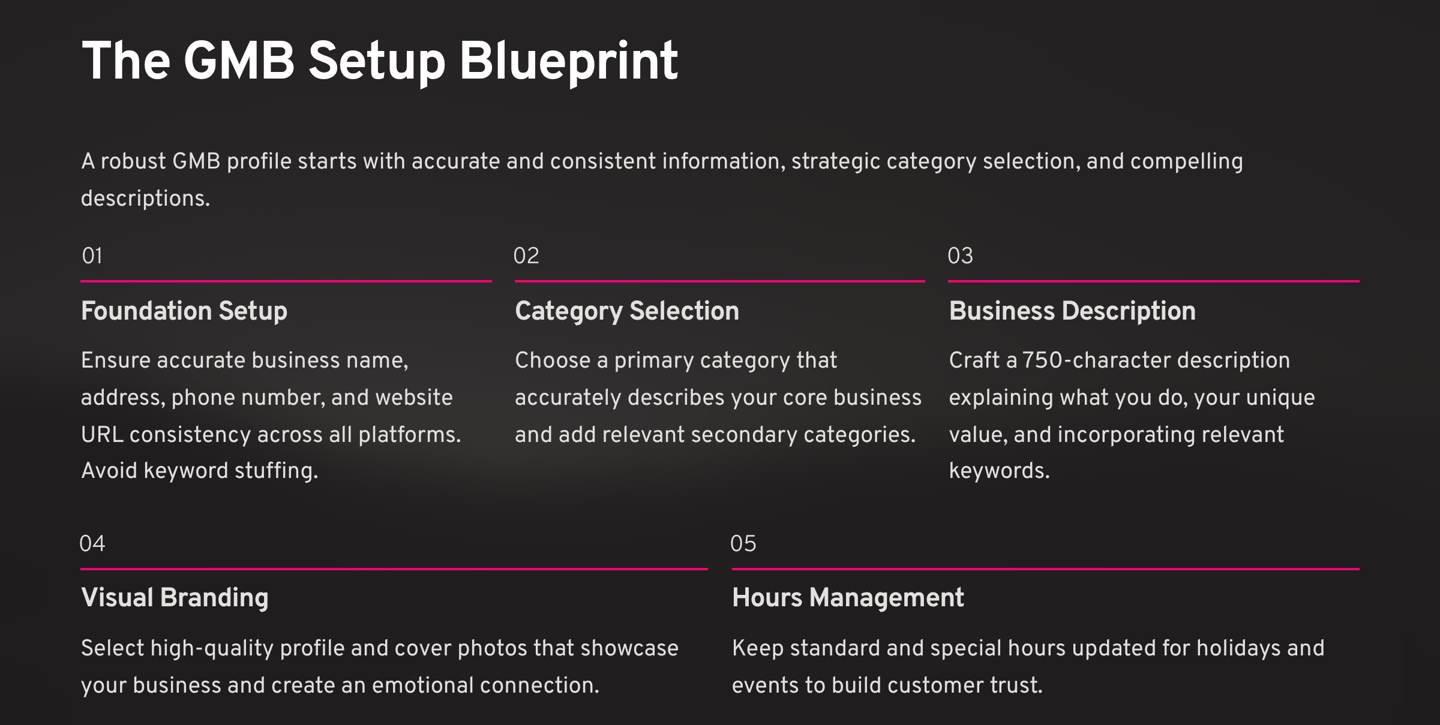

The Complete GMB Setup Blueprint {#complete-gmb-setup-blueprint}
Phase 1: Foundation Setup
Business Information Accuracy
Your business information forms the foundation of your entire local SEO strategy. Every detail must be accurate, consistent, and optimized for both search algorithms and customer experience.
Business Name Optimization: Use your exact legal business name as it appears on your registration documents. Avoid keyword stuffing in your business name, as this violates Google's guidelines and can result in suspension. However, if you operate under a brand name that includes descriptive terms (like "Downtown Dental Care"), that's perfectly acceptable.
Address Consistency: Your address must match exactly across all online platforms. Even small discrepancies like "Street" versus "St." can confuse search algorithms and dilute your local SEO effectiveness. If you're a service-area business that visits customers, you can hide your address while still serving your geographic area.
Phone Number Strategy: Use a local phone number whenever possible. Google prefers local numbers and customers trust them more. If you have multiple locations, each should have its own unique phone number. Avoid using call tracking numbers as your primary GMB number, as frequent changes can harm your rankings.
Website URL Optimization: Link to the most relevant page of your website. For single-location businesses, this is typically your homepage. For multi-location businesses, link to the specific location page that corresponds to that GMB profile.
Phase 2: Category Selection Strategy
Primary Category Selection
Your primary category is one of the most important ranking factors in local search. Choose the category that most accurately describes your core business activity. This should align with what customers actually search for when looking for your services.
Research your competitors' categories by looking at businesses ranking well in your area. Note their primary categories and consider whether they align with your business model. However, don't choose a category just because competitors use it—accuracy and relevance to your actual business operations must come first.
Secondary Category Optimization
Add relevant secondary categories that accurately represent additional services or aspects of your business. For example, a restaurant might use "Italian Restaurant" as primary and add "Pizza Restaurant," "Wine Bar," and "Catering Service" as secondary categories.
Avoid category stuffing—only add categories that genuinely represent significant aspects of your business. Google can penalize businesses that use irrelevant categories to try to appear in more searches.
Phase 3: Business Description Excellence
Your business description is your opportunity to communicate directly with potential customers while incorporating relevant keywords naturally. This 750-character space should accomplish three goals: explain what you do, highlight what makes you unique, and include relevant local and service keywords.
Effective Description Framework:
Opening Statement: Clearly state what you do and who you serve. Unique Value Proposition: Explain what sets you apart from competitors. Service Keywords: Naturally incorporate relevant service terms. Local Elements: Mention your location and service areas. Call to Action: End with a compelling reason to contact you.
Example for a Local Marketing Agency: "MarketWhale IT helps local businesses grow through AI-powered marketing automation and customer acquisition systems. Our proven solutions include smart website development, automated review management, and 24/7 AI chatbots that convert visitors into customers. Serving businesses across [Your City] with comprehensive digital marketing strategies that deliver measurable results. Contact us to transform your marketing and accelerate your growth."
Phase 4: Visual Branding Strategy
Profile Photo Selection
Your profile photo is often the first visual impression customers have of your business. For brick-and-mortar locations, use a clear, well-lit photo of your storefront or building exterior. Ensure your business name and signage are clearly visible.
For service-based businesses, consider using your company logo or a professional photo that represents your brand. The image should be high-quality, well-composed, and instantly recognizable.
Cover Photo Impact
Your cover photo should showcase what makes your business special. This could be your team in action, your best products, your workspace, or happy customers. The cover photo should tell a story about your business and create an emotional connection with viewers.
Avoid generic stock photos. Authentic images of your actual business perform better and build more trust with potential customers.
Phase 5: Business Hours and Special Hours Management
Standard Hours Optimization
Accurate hours are crucial for customer experience and local SEO. Google considers businesses with regularly updated, accurate hours as more reliable and trustworthy.
Be specific about your hours, including lunch breaks or split schedules if applicable. If you offer 24/7 services, make sure to indicate this clearly.
Special Hours Strategy
Keep your special hours updated for holidays, events, and temporary changes. Customers who arrive at closed businesses due to incorrect hours information often leave negative reviews and never return.
Consider using special hours strategically for extended holiday shopping hours, special events, or seasonal schedule changes. These updates signal to Google that your business information is actively maintained.
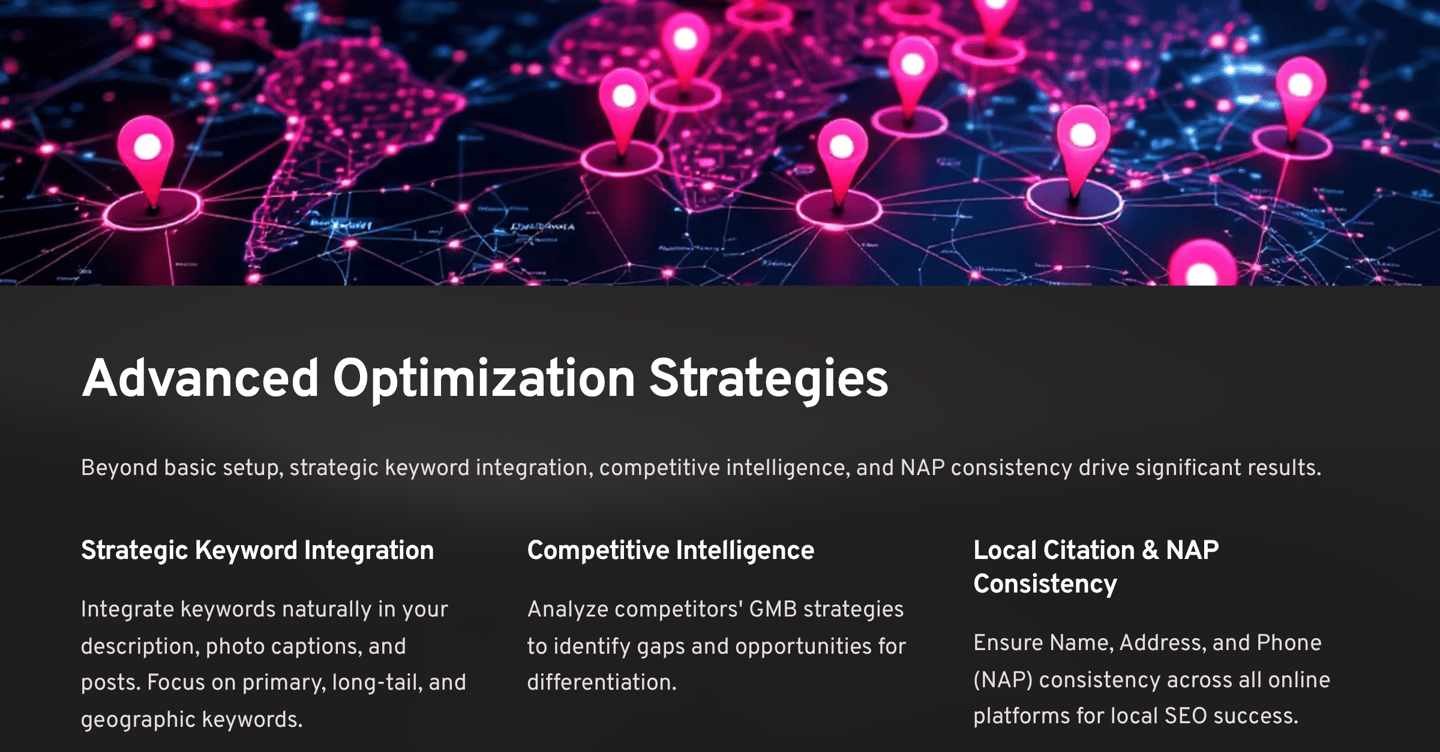

Advanced Optimization Strategies That Drive Results {#advanced-optimization-strategies}
Strategic Keyword Integration
Natural Keyword Placement
Unlike traditional SEO where keyword density matters significantly, GMB optimization requires a more nuanced approach. Keywords should be integrated naturally throughout your profile in ways that enhance user experience rather than detract from it.
Primary Keyword Strategy: Your main service keyword should appear in your business description, some photo captions, and potentially in post content. However, it should never feel forced or unnatural.
Long-Tail Keyword Opportunities: Use your posts, Q&A responses, and photo descriptions to target longer, more specific search queries. These often have less competition and higher conversion rates.
Geographic Keyword Integration: Include location-based keywords naturally throughout your profile. This includes neighborhood names, nearby landmarks, and regional terms that locals use.
Competitive Intelligence and Positioning
Competitor Analysis Framework
Study businesses ranking well in your category and geographic area. Analyze their:
Category selections and how they align with search results
Photo strategies and visual branding approaches
Post frequency and content themes
Review response strategies and tone
Special features and GMB services they utilize
Differentiation Strategy
Use your competitive research to identify gaps and opportunities. If competitors are neglecting certain aspects of their GMB profiles, that represents an opportunity for you to stand out.
Focus on areas where you can genuinely provide superior value rather than simply copying what others do. Authenticity and unique value propositions perform better than imitation.
Local Citation and NAP Consistency
The Foundation of Local Trust
Name, Address, and Phone number (NAP) consistency across the internet forms the foundation of local SEO success. Google uses this information to verify your business legitimacy and understand your location relevance for different searches.
Citation Building Strategy
Build citations on relevant local directories, industry-specific platforms, and authoritative general directories. Quality matters more than quantity—focus on directories that your customers actually use and that Google recognizes as authoritative.
Consistency Monitoring
Regularly audit your business information across all platforms. Even small inconsistencies can confuse search algorithms and reduce your local rankings. This includes:
Exact business name spelling
Address formatting (including suite numbers, abbreviations)
Phone number formatting
Website URL accuracy
Business hours consistency
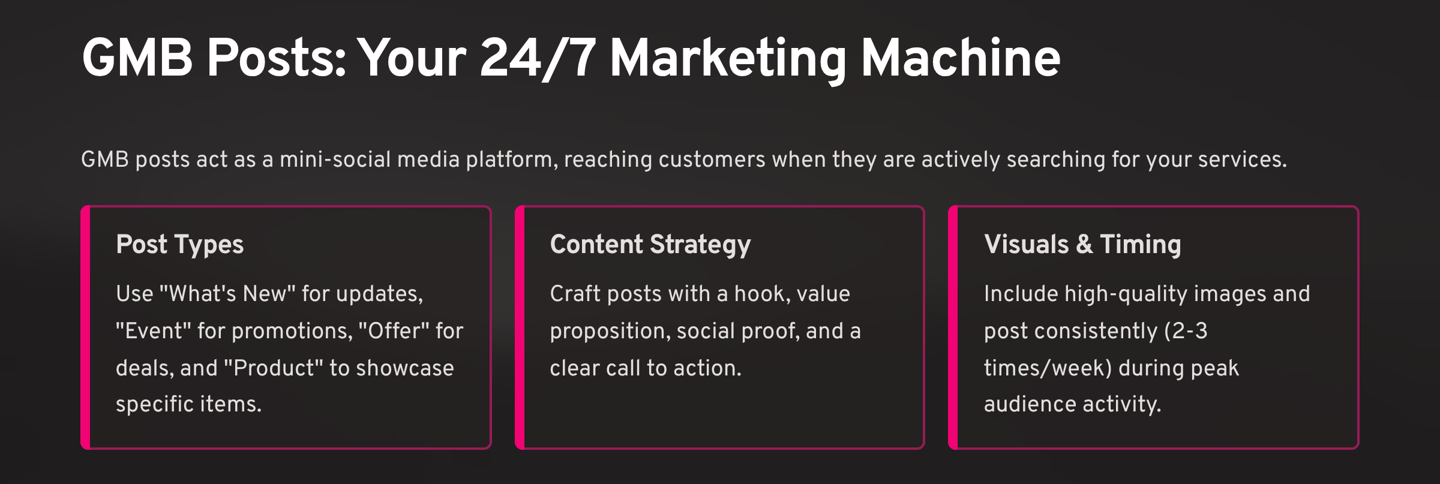

Google My Business Posts: Your 24/7 Marketing Machine {#gmb-posts-marketing-machine}
Understanding GMB Posts Strategy
Google My Business posts function as a mini-social media platform that appears directly in your search results. Unlike traditional social media, GMB posts reach customers at the exact moment they're searching for your services—making them incredibly powerful for conversion.
Post Types and Strategic Applications
What's New Posts: Perfect for announcing new services, policy changes, or business updates. These posts help keep your profile fresh and demonstrate that your business is active and evolving.
Event Posts: Ideal for promoting special events, sales, workshops, or seasonal offerings. Event posts include date and time information, making them perfect for time-sensitive promotions.
Offer Posts: Designed specifically for promotions and deals. These posts include terms and conditions and can significantly increase click-through rates when customers see immediate value.
Product Posts: Showcase specific products or services with pricing information. These work exceptionally well for retail businesses, restaurants, and service providers with clearly defined offerings.
Content Strategy That Converts
The Psychology of Local Search
When people search locally, they're usually ready to take action. Your GMB posts should speak to customers who are in decision-making mode, not those who are just browsing.
Effective Post Structure:
Hook: Start with something that immediately captures attention—a benefit, a question, or an interesting fact. Value Proposition: Quickly explain what you're offering and why it matters. Social Proof: Include customer testimonials, results, or trust signals when relevant. Clear Call to Action: Tell people exactly what to do next.
Content Themes That Work
Behind-the-Scenes Content: Show your team in action, your process, or your workspace. This builds trust and makes your business feel more personal and approachable.
Customer Success Stories: Share specific examples of how you've helped customers achieve their goals. Include details that potential customers can relate to.
Educational Content: Provide valuable tips, insights, or industry knowledge that positions you as an expert while helping your audience.
Local Community Engagement: Highlight your involvement in local events, partnerships with other businesses, or community initiatives.
Advanced Post Optimization Techniques
Visual Content Strategy
Every post should include high-quality, relevant imagery. Photos in GMB posts receive significantly more engagement than text-only posts. Use images that:
Showcase your products or services in action
Feature real customers (with permission)
Highlight your business location and atmosphere
Demonstrate your expertise or process
Timing and Frequency Optimization
Post consistently but strategically. Daily posting isn't necessary, but regular posting (2-3 times per week) signals to Google that your business is active and engaged with customers.
Time your posts when your audience is most active. For most local businesses, this is typically:
Tuesday through Thursday for B2B services
Thursday through Sunday for consumer services
Lunch hours and early evening for restaurants and retail
Call-to-Action Optimization
Every post should have a clear, compelling call to action. Generic CTAs like "Contact us" are less effective than specific actions like "Schedule your free consultation today" or "Reserve your table for tonight's special menu."
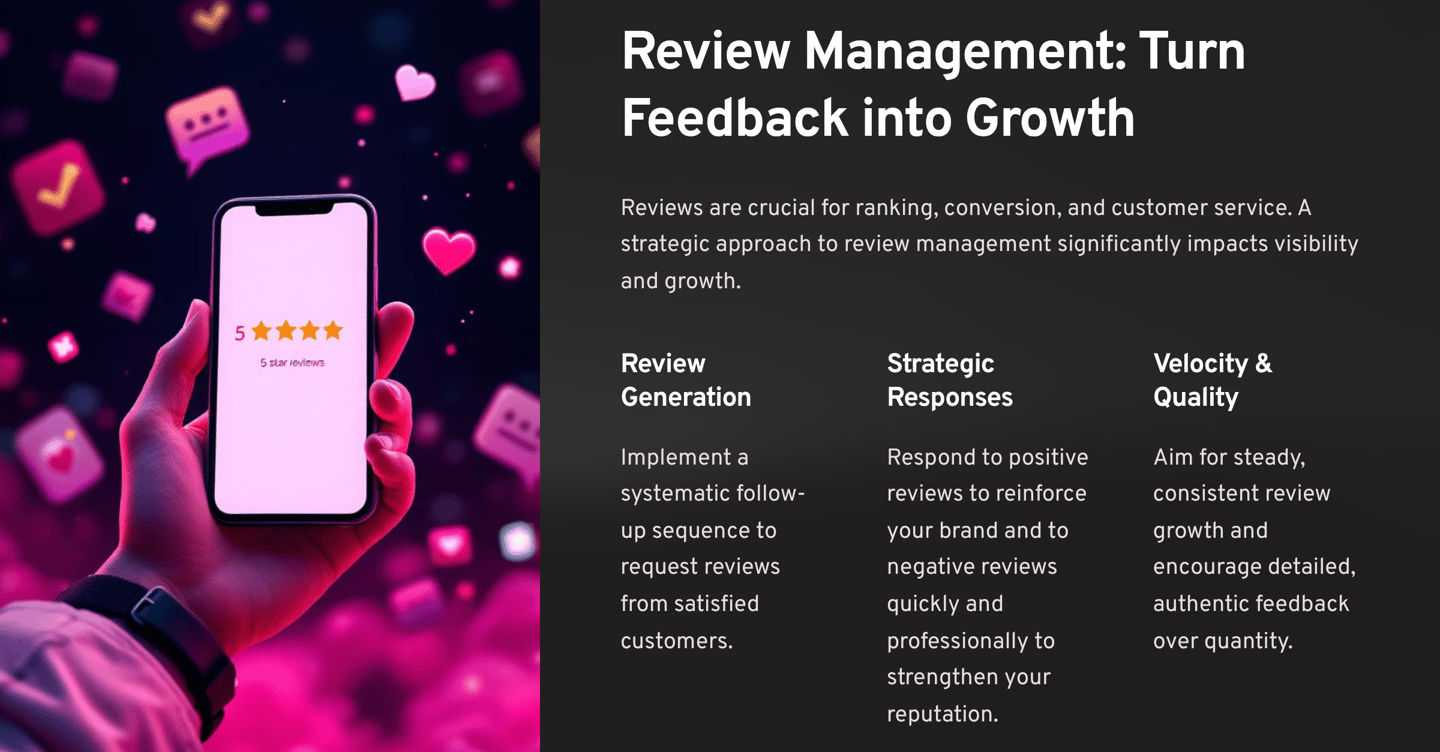

Review Management: Turn Customer Feedback into Growth {#review-management-growth}
The Review Ecosystem Strategy
Reviews are far more than just social proof—they're ranking factors, conversion tools, and customer service opportunities all in one. A strategic approach to review management can significantly impact both your search visibility and your business growth.
Review Generation Systems
The Follow-Up Sequence: Implement a systematic approach to requesting reviews from satisfied customers. The most effective method is a multi-touch sequence that begins immediately after service completion.
Immediate Thank You: Send a personalized thank you message within 24 hours of service completion. Value-Add Follow-Up: Provide additional value (tips, resources, or exclusive offers) 3-5 days later. Review Request: Ask for a review 7-10 days after service, when the positive experience is still fresh but any immediate issues have been resolved. Gentle Reminder: Send a final, casual reminder 2-3 weeks later for customers who haven't left a review.
Review Request Optimization
The way you ask for reviews dramatically impacts your response rate. Instead of generic requests, create personalized messages that:
Reference specific aspects of their experience
Explain how reviews help your business serve future customers
Make the process as easy as possible with direct links
Express genuine gratitude regardless of their decision
Strategic Review Response Framework
Positive Review Responses
Responding to positive reviews isn't just about saying thank you—it's an opportunity to reinforce your brand message, highlight key services, and encourage specific customer behaviors.
Effective Positive Response Elements:
Personal acknowledgment of the customer by name
Specific reference to their experience or feedback
Reinforcement of your key value propositions
Subtle invitation for future engagement or referrals
Example Response: "Thank you so much, Sarah! We're thrilled that our AI-powered customer service system made your experience so seamless. Your feedback about our 24/7 support really motivates our team to continue innovating. We'd love to help with any future automation needs, and please don't hesitate to refer colleagues who might benefit from similar solutions!"
Negative Review Management
Negative reviews, when handled properly, can actually strengthen your business reputation and provide valuable feedback for improvement. The key is responding quickly, professionally, and constructively.
Negative Response Framework: Immediate Acknowledgment: Respond within 24 hours to show you take feedback seriously. Take Responsibility: Acknowledge the customer's experience without making excuses. Offer Solution: Provide a specific way to address their concern. Move Offline: Invite them to discuss the matter privately to resolve it fully. Learn and Improve: Use the feedback to prevent similar issues in the future.
Review Velocity and Quality Balance
Sustainable Review Growth
Rapid increases in review volume can trigger Google's spam detection systems, potentially harming your rankings. Aim for steady, consistent review growth that aligns with your actual customer volume.
Quality Over Quantity Focus
One detailed, authentic review is worth more than ten generic five-star reviews. Encourage customers to share specific details about their experience, the problems you solved, and the results they achieved.
Review Diversity Strategy
Encourage reviews that mention different aspects of your business:
Various services you offer
Different team members
Specific problems you solved
Unique aspects of your customer experience
This diversity helps Google understand the full scope of your business and can improve your visibility for various related searches.


Google Q&A Mastery: Control Your Narrative {#google-qa-mastery}
Understanding the Q&A Opportunity
The Questions & Answers section of your GMB profile is one of the most underutilized features, yet it offers incredible potential for controlling your business narrative and improving your search visibility.
Proactive Q&A Strategy
Don't wait for customers to ask questions—anticipate their needs and create a comprehensive Q&A resource that addresses common concerns before they become obstacles to conversion.
Strategic Question Development
Create questions that allow you to highlight your key advantages, address common objections, and incorporate relevant keywords naturally. Focus on questions that real customers ask during the sales process.
Effective Q&A Categories:
Service-Related Questions: "What types of AI automation solutions do you offer for small businesses?" Process Questions: "How long does it typically take to implement your customer support AI systems?" Pricing and Value Questions: "Do you offer free consultations for businesses exploring AI automation?" Trust and Credibility Questions: "How long have you been helping businesses with AI-powered marketing solutions?"
Advanced Q&A Optimization
Keyword Integration in Answers
Your answers provide excellent opportunities to naturally incorporate relevant keywords while providing genuine value to potential customers. Focus on long-tail keywords that reflect actual customer search behavior.
Answer Structure for Maximum Impact: Direct Answer: Address the question clearly and concisely. Additional Value: Provide extra information that demonstrates your expertise. Trust Signal: Include relevant credentials, experience, or results. Call to Action: Guide the reader toward the next step in their customer journey.
Community Management Approach
Monitor your Q&A section regularly for new questions from actual customers. Respond quickly and professionally to all legitimate questions. This demonstrates excellent customer service and keeps your Q&A section active and relevant.
For inappropriate or spam questions, report them to Google for removal rather than responding directly.
Local SEO Integration: Making Everything Work Together {#local-seo-integration}
Creating a Unified Local Presence
Your GMB profile doesn't exist in isolation—it's part of a comprehensive local SEO ecosystem that includes your website, citations, reviews, and social media presence. The most successful local businesses create synergy between all these elements.
Website and GMB Alignment
Content Consistency: Your website content should align with and support your GMB profile information. If your GMB profile emphasizes certain services, your website should provide detailed information about those same services.
Local Landing Pages: Create dedicated landing pages for each location and service area you serve. These pages should include your complete NAP information and link back to your GMB profile.
Schema Markup Implementation: Use structured data markup on your website to help Google understand your business information and connect it to your GMB profile.
Citation Building and Management Strategy
Priority Citation Platforms
Focus your citation building efforts on platforms that matter most for your industry and location:
Universal Directories: Google My Business, Bing Places, Apple Maps, Facebook Business Industry-Specific Directories: Platforms relevant to your specific business type Local Directories: Chamber of Commerce, local business associations, city directories Review Sites: Yelp, industry-specific review platforms
Citation Quality Assessment
Not all citations are equal. High-quality citations come from:
Authoritative, well-established websites
Platforms that your customers actually use
Sites with strong domain authority and local relevance
Directories that Google recognizes and trusts
Advanced Local SEO Techniques
Geo-Targeted Content Creation
Develop content that specifically targets local search terms and addresses local customer needs. This could include:
Neighborhood-specific service pages
Local event participation and coverage
Community involvement and partnerships
Local market insights and trends
Local Link Building
Build relationships with other local businesses, organizations, and influencers to earn high-quality local backlinks. These might come from:
Local business partnerships and collaborations
Chamber of Commerce memberships
Community event participation
Local media coverage and press releases
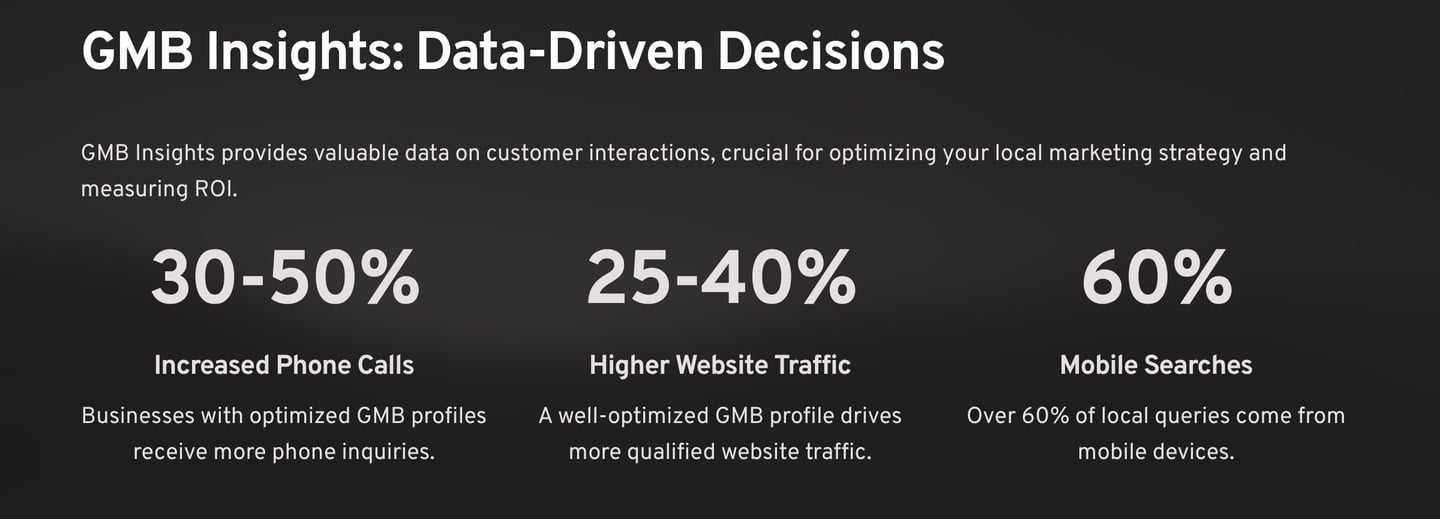

GMB Insights: Data-Driven Decision Making {#gmb-insights-analytics}
Understanding GMB Analytics
GMB Insights provides valuable data about how customers find and interact with your business. This information is crucial for optimizing your local marketing strategy and measuring your return on investment.
Key Metrics to Monitor
Search Queries: Understand exactly what terms customers use to find your business. This data helps you optimize your profile, website content, and advertising strategies.
Customer Actions: Track how customers interact with your profile—whether they call, visit your website, request directions, or view your photos. This data reveals what aspects of your profile are most effective at driving conversions.
Photo Views: Monitor which photos receive the most views to understand what visual content resonates with your audience.
Competitive Benchmarking: Compare your performance to similar businesses in your area to identify opportunities for improvement.
Data-Driven Optimization Strategies
Search Query Analysis
Regularly review the search queries that lead customers to your profile. Look for:
High-volume terms you're not currently optimizing for
Geographic qualifiers customers use in their searches
Service variations or terminology you haven't considered
Questions or needs that your current content doesn't address
Performance Pattern Recognition
Analyze your data for patterns and trends:
Which days and times generate the most customer activity
Seasonal fluctuations in search behavior
The relationship between post frequency and customer engagement
Correlation between review generation and profile visibility
Conversion Path Analysis
Understanding how customers move from discovering your profile to becoming paying customers helps you optimize each step of the process. Track:
Which customer actions lead to actual sales
The typical timeline from first interaction to purchase
Which marketing messages resonate most with your audience
Barriers that prevent potential customers from taking action
Advanced Analytics Implementation
Goal Tracking Setup
Connect your GMB performance to your broader business analytics by:
Setting up conversion tracking for GMB-driven website traffic
Creating custom UTM parameters for GMB profile links
Monitoring phone call conversions from your GMB listing
Tracking foot traffic increases correlated with GMB optimization efforts
ROI Measurement Framework
Develop a system for measuring the financial impact of your GMB optimization efforts:
Calculate the lifetime value of customers acquired through local search
Track revenue attribution from GMB-driven leads
Monitor cost savings from reduced advertising spend due to improved organic visibility
Measure efficiency gains from better-qualified leads


Advanced Features and Emerging Opportunities {#advanced-features-opportunities}
Google My Business Messaging
24/7 Customer Communication
GMB messaging allows customers to contact you directly from your Google listing. This feature can significantly improve customer experience and provide another conversion opportunity.
Messaging Best Practices:
Respond quickly—ideally within minutes during business hours
Use messaging to qualify leads before they call or visit
Provide helpful information that moves customers toward a purchase decision
Use messaging as an opportunity to showcase your customer service quality
Automated Messaging Integration
Consider integrating your GMB messaging with AI-powered customer service systems that can provide instant responses to common questions while escalating complex inquiries to human team members. This approach ensures 24/7 availability while maintaining personal touch when needed.
Google My Business Booking Integration
Service Business Opportunities
If you're a service-based business, GMB booking integration can streamline your customer acquisition process by allowing customers to schedule appointments directly from your Google listing.
Booking System Optimization:
Offer multiple appointment types and time slots
Include clear service descriptions and pricing information
Send automated confirmation and reminder messages
Follow up after appointments to ensure satisfaction and encourage reviews
Advanced Photo and Video Strategies
Visual Storytelling Approach
Your GMB photos should tell the complete story of your customer experience. Create a visual journey that includes:
Exterior shots that help customers find and recognize your location
Interior photos that showcase your atmosphere and professionalism
Team photos that put faces to your brand and build trust
Service photos that demonstrate your capabilities and quality
Product photos that highlight your best offerings
Customer photos that provide social proof and authenticity
Video Content Integration
Video content in GMB profiles receives higher engagement rates and can significantly improve your local search visibility. Consider creating:
Brief introduction videos featuring your team or owner
Service demonstration videos showing your expertise
Customer testimonial videos providing authentic social proof
Behind-the-scenes content that humanizes your brand
Emerging GMB Features and Opportunities
Google My Business Website
For businesses without a website, Google offers a simple website creation tool integrated with your GMB profile. While this isn't a replacement for a professional website, it can provide a basic online presence that's automatically optimized for local search.
Health and Safety Attributes
Post-pandemic, health and safety information has become crucial for many businesses. Use relevant attributes to communicate your safety protocols and build customer confidence.
Sustainability and Social Responsibility
Google continues to add attributes related to sustainability, accessibility, and social responsibility. These features can help you attract customers who value these aspects and differentiate your business from competitors.
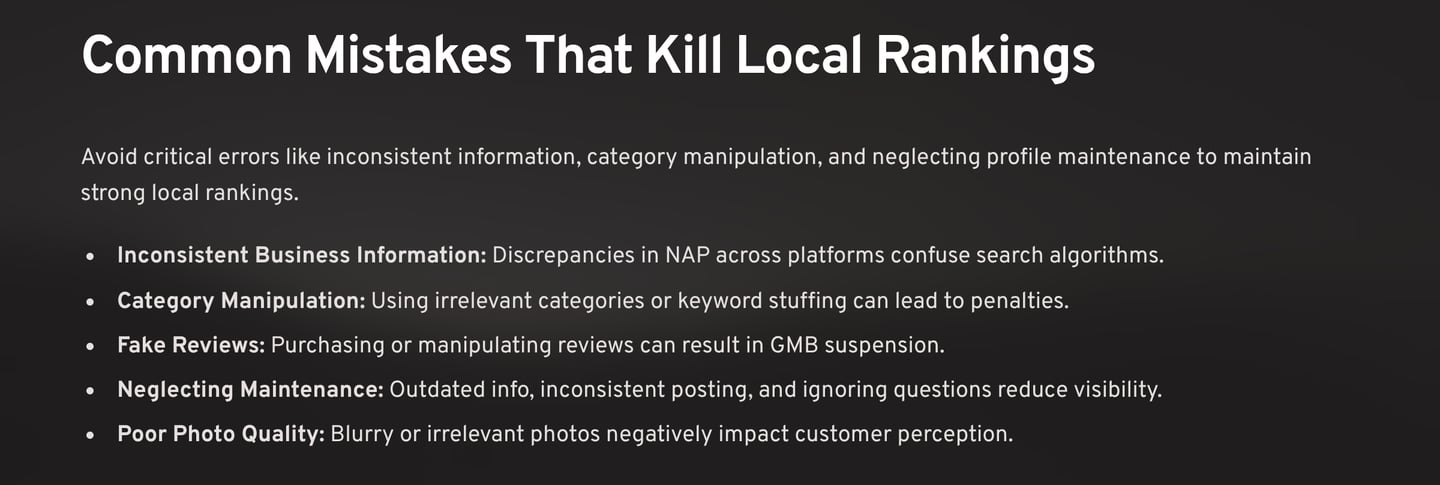

Common Mistakes That Kill Your Local Rankings {#common-mistakes-local-rankings}
Critical Errors to Avoid
Inconsistent Business Information
The fastest way to harm your local SEO is through inconsistent business information across platforms. Google's algorithms rely on consistency to validate business legitimacy. Even small discrepancies can significantly impact your rankings.
Common Consistency Issues:
Different phone number formats across platforms
Variations in business name (including LLC, Inc., etc.)
Address abbreviations that don't match
Inconsistent business hour information
Different website URLs or redirect chains
Category Manipulation and Keyword Stuffing
Category Violations: Using categories that don't accurately represent your business or adding categories just to appear in more searches violates Google's guidelines and can result in profile suspension.
Keyword Stuffing: Attempting to manipulate your business name or description with excessive keywords makes your profile appear spammy and can trigger Google penalties.
Fake Reviews and Manipulation
Review Fraud Risks: Purchasing fake reviews, incentivizing reviews inappropriately, or attempting to manipulate your review profile can result in severe penalties, including complete GMB suspension.
Legitimate Review Strategies: Focus on providing exceptional customer experiences and implementing systematic processes for encouraging genuine reviews from real customers.
Profile Management Pitfalls
Neglecting Profile Maintenance
Outdated Information: Failing to update your profile when business information changes creates a poor customer experience and signals to Google that your business may be inactive or unreliable.
Inconsistent Posting: Long gaps between posts or irregular posting schedules can reduce your profile's visibility in local search results.
Ignoring Customer Questions: Failing to respond to customer questions in your Q&A section misses conversion opportunities and can indicate poor customer service to potential customers.
Photo Quality and Relevance Issues
Low-Quality Images: Blurry, poorly lit, or unprofessional photos can significantly impact customer perceptions and reduce conversion rates.
Irrelevant or Misleading Photos: Using stock photos, images that don't represent your actual business, or photos that misrepresent your services can lead to customer disappointment and negative reviews.
Compliance and Guidelines Adherence
Google My Business Policy Violations
Understanding and adhering to Google's GMB guidelines is crucial for maintaining your profile and avoiding penalties:
Prohibited Practices:
Creating multiple profiles for the same location
Using virtual offices or mailboxes for service area businesses
Including keywords, marketing messages, or promotional content in business names
Adding fake or misleading business information
Attempting to manipulate rankings through artificial means
Best Practice Compliance:
Regularly review Google's updated guidelines and policies
Ensure all business information is accurate and verifiable
Use only authentic photos and information
Respond to all guidelines changes promptly
Maintain professional standards in all customer interactions
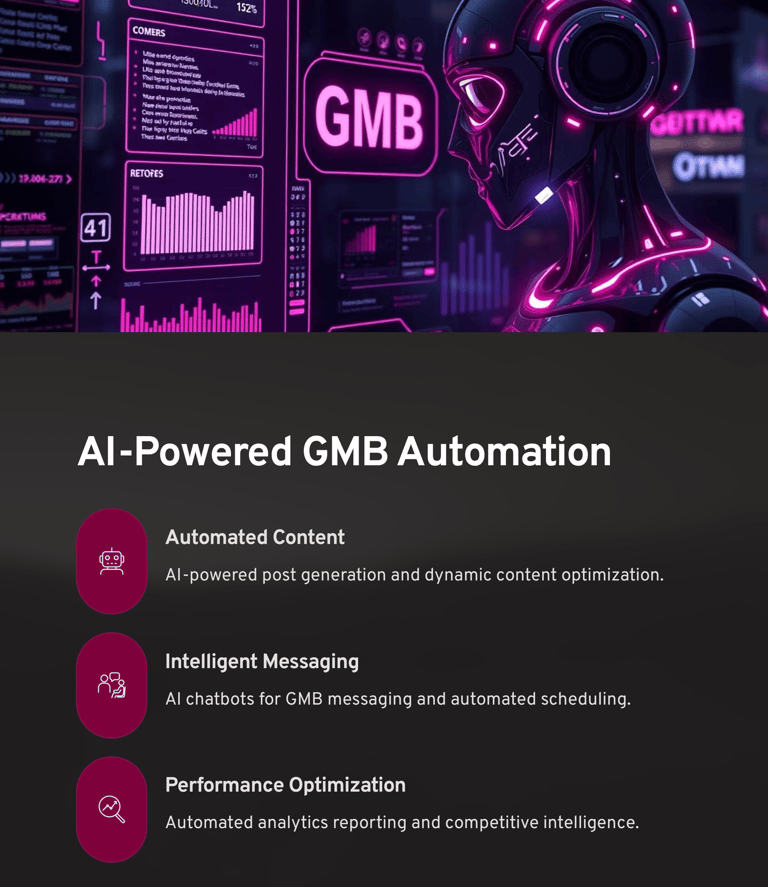

AI-Powered GMB Automation Strategies {#ai-powered-gmb-automation}
The Future of Local Business Management
As AI technology continues to evolve, smart business owners are leveraging automation to maximize their GMB effectiveness while minimizing manual management time. The key is finding the right balance between automation efficiency and personal authenticity.
Automated Content Creation Systems
AI-Powered Post Generation: Implement systems that can create relevant, engaging GMB posts based on your business activities, seasonal trends, and customer behavior patterns. These systems can maintain consistent posting schedules while ensuring content remains fresh and relevant.
Dynamic Content Optimization: Use AI to analyze which types of content perform best for your specific audience and automatically adjust your content strategy based on performance data.
Intelligent Review Management
Automated Review Monitoring: Set up systems that monitor all your review platforms in real-time and alert you immediately when new reviews appear, allowing for rapid response times.
AI-Assisted Review Responses: While maintaining authenticity, use AI tools to help craft appropriate responses to reviews, ensuring consistency in tone and messaging while saving time on routine acknowledgments.
Smart Review Generation Campaigns: Implement automated follow-up sequences that identify satisfied customers and guide them through the review process at optimal times.
Customer Communication Automation
Intelligent Messaging Systems
AI Chatbots for GMB Messaging: Integrate sophisticated AI chatbots that can handle initial customer inquiries through your GMB messaging, qualifying leads and providing immediate responses while escalating complex issues to human team members.
Automated Appointment Scheduling: Connect your GMB profile to AI-powered scheduling systems that allow customers to book appointments directly through your listing, with automatic confirmation and reminder sequences.
Smart FAQ Management: Use AI to analyze common customer questions and automatically update your Q&A section with relevant, helpful responses that address actual customer needs.
Performance Optimization Through Automation
Data-Driven Decision Making
Automated Analytics Reporting: Set up systems that regularly analyze your GMB performance data and provide actionable insights for optimization.
Competitive Intelligence Automation: Implement tools that monitor competitor GMB activities and alert you to optimization opportunities or market changes.
Performance Correlation Analysis: Use AI to identify relationships between your GMB activities and business outcomes, helping you focus efforts on the highest-impact strategies.


Industry-Specific Optimization Tactics {#industry-specific-optimization}
Service-Based Business Optimization
Professional Services Strategy
For consultants, agencies, and professional service providers, GMB optimization focuses heavily on expertise demonstration and trust building.
Key Focus Areas:
Showcase credentials and certifications through photos and posts
Highlight case studies and client success stories
Use Q&A to address common concerns about your services
Demonstrate thought leadership through educational content
Home Services Excellence
For contractors, technicians, and home service providers, GMB optimization emphasizes reliability, quality, and customer satisfaction.
Optimization Priorities:
Before and after photos showcasing work quality
Emergency service availability and response times
Licensing and insurance information in posts
Customer testimonials featuring specific problem solutions
Service area maps and travel policies
Retail and E-commerce Integration
Physical Store Optimization
Retail businesses have unique opportunities to drive both foot traffic and online sales through strategic GMB optimization.
Retail-Specific Strategies:
Product showcases with current pricing and availability
Store layout and atmosphere photos
Seasonal promotions and inventory updates
Integration with Google Shopping and local inventory ads
Store pickup and delivery options
Hybrid Business Models
For businesses operating both physical and online stores, GMB optimization should seamlessly connect both experiences:
Highlight click-and-collect services
Showcase online ordering with in-store pickup
Feature exclusive in-store experiences or events
Demonstrate how online and offline experiences complement each other
Restaurant and Food Service Mastery
Menu and Dining Experience Showcase
Restaurant GMB profiles have specific features and opportunities that other businesses don't have access to.
Restaurant Optimization Focus:
High-quality food photography for every menu section
Atmosphere and ambiance photos for different dining experiences
Special dietary options and accommodation information
Seasonal menu changes and chef specials
Private dining and event space capabilities
Health and Safety Communication
Post-pandemic dining requires clear communication about health protocols, outdoor dining options, delivery services, and safety measures.
Healthcare and Professional Services
Trust and Expertise Building
Healthcare providers and professional services need to balance accessibility with professionalism in their GMB optimization.
Professional Service Priorities:
Staff credentials and specialization information
Office environment and equipment showcases
Patient or client testimonials (following privacy regulations)
Educational content that demonstrates expertise
Clear communication about services and processes
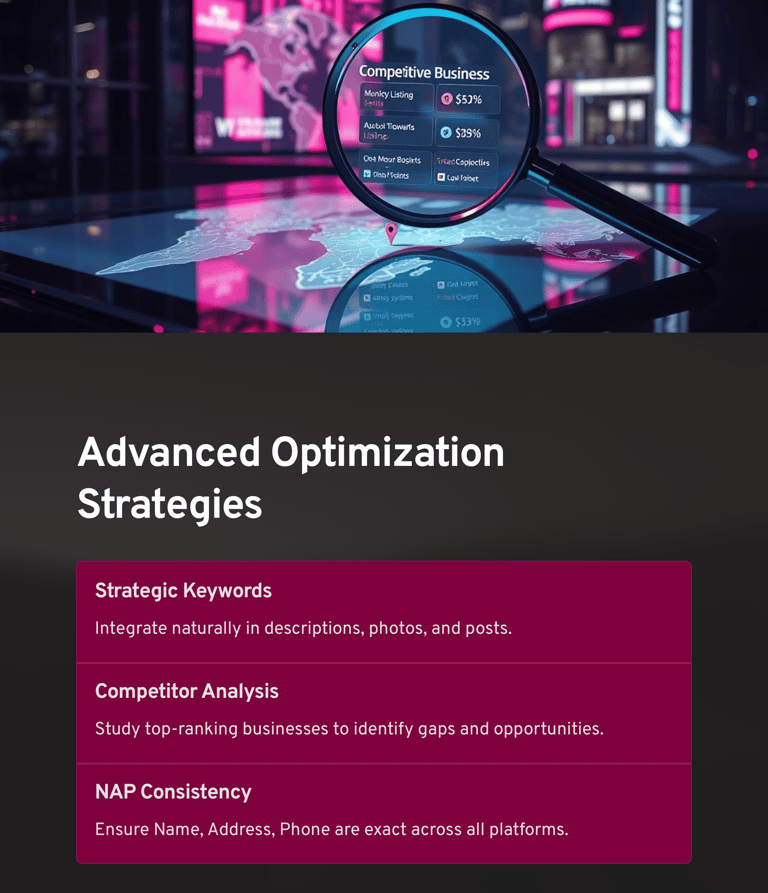

Advanced Technical Implementation {#advanced-technical-implementation}
Schema Markup and Structured Data
Local Business Schema Implementation
Structured data markup helps Google understand your business information more clearly and can improve your visibility in local search results.
Essential Schema Types for Local Businesses:
{ "@context": "https://schema.org", "@type": "LocalBusiness", "name": "Your Business Name", "address": { "@type": "PostalAddress", "streetAddress": "123 Main Street", "addressLocality": "Your City", "addressRegion": "Your State", "postalCode": "12345" }, "telephone": "+1-555-123-4567", "openingHours": ["Mo-Fr 09:00-17:00", "Sa 09:00-15:00"], "geo": { "@type": "GeoCoordinates", "latitude": "40.7128", "longitude": "-74.0060" }, "url": "https://www.yourbusiness.com", "priceRange": "$" }
Review Schema Integration
Implement review schema markup to help Google understand and display your customer feedback more effectively:
{ "@context": "https://schema.org", "@type": "Review", "reviewRating": { "@type": "Rating", "ratingValue": "5", "bestRating": "5" }, "author": { "@type": "Person", "name": "Customer Name" }, "reviewBody": "Excellent service and results...", "itemReviewed": { "@type": "LocalBusiness", "name": "Your Business Name" } }
GMB API Integration and Automation
Advanced Profile Management
For businesses with multiple locations or those requiring frequent updates, GMB API integration can streamline management and ensure consistency across all profiles.
API Implementation Benefits:
Bulk updates across multiple locations
Automated posting schedules
Real-time inventory or service updates
Centralized review monitoring and response
Performance tracking and reporting automation
Custom Automation Solutions
Develop custom automation workflows that integrate your GMB management with other business systems:
CRM integration for customer data synchronization
Inventory management system connections for real-time updates
Social media cross-posting for content amplification
Customer service system integration for seamless support
Mobile Optimization Excellence
Mobile-First Local Search
With over 60% of local searches happening on mobile devices, your GMB optimization strategy must prioritize mobile user experience.
Mobile Optimization Checklist:
Ensure your business phone number is click-to-call enabled
Optimize your website for mobile viewing and fast loading
Create mobile-friendly content that's easy to read on small screens
Test your GMB profile appearance and functionality on various mobile devices
Prioritize the most important information for mobile users
Location-Based Mobile Features
Take advantage of mobile-specific features that can improve customer experience:
Enable location sharing for easy directions
Implement mobile ordering or reservation systems
Create location-based notifications and offers
Optimize for voice search queries common in mobile usage
Measuring Success and ROI {#measuring-success-roi}
Key Performance Indicators (KPIs)
Primary GMB Metrics
Track metrics that directly correlate with business growth and revenue:
Visibility Metrics:
Search query impressions for relevant keywords
Map pack appearance frequency
Local search ranking positions for key terms
Engagement Metrics:
Profile views and customer actions
Photo views and engagement rates
Post engagement and click-through rates
Website clicks from GMB profile
Conversion Metrics:
Phone calls generated from GMB listing
Direction requests and foot traffic correlation
Online conversions attributed to GMB traffic
Review generation rate and quality
Advanced Attribution Modeling
Multi-Touch Attribution Understanding
Local customer journeys often involve multiple touchpoints before conversion. A customer might:
Find you through a Google search
Check your reviews and photos
Visit your website
Return later to call or visit
Make a purchase after comparing with competitors
Understanding this journey helps you optimize each touchpoint for maximum effectiveness.
Lifetime Value Calculation
Calculate the true ROI of your GMB optimization by considering:
Average customer lifetime value
Referral rates from satisfied customers
Repeat purchase patterns
Cross-selling and upselling opportunities
Reduced customer acquisition costs from improved organic visibility
Continuous Improvement Framework
Regular Optimization Audits
Conduct monthly audits of your GMB performance to identify optimization opportunities:
Review search query data for new keyword opportunities
Analyze competitor activities and market changes
Assess photo performance and update underperforming content
Evaluate customer feedback themes for business improvement opportunities
A/B Testing for Local Optimization
Test different approaches to optimize your GMB performance:
Different post types and content themes
Various call-to-action messages and offers
Alternative photo styles and composition approaches
Different review request strategies and timing
Integration with Broader Marketing Strategy {#integration-broader-marketing}
Omnichannel Local Marketing
Connecting Online and Offline Experiences
Your GMB profile should seamlessly integrate with all your other marketing channels to create a cohesive customer experience.
Cross-Channel Consistency:
Align your GMB messaging with your website, social media, and advertising campaigns
Use consistent visual branding across all platforms
Coordinate promotions and offers across channels
Ensure customer service quality matches across all touchpoints
Local Advertising Enhancement
Google Ads Local Extensions
Combine your GMB optimization with Google Ads local extensions to maximize your visibility and provide comprehensive business information to potential customers.
Social Media Geo-Targeting
Use your GMB insights to inform your social media advertising strategies:
Target specific geographic areas where you're already performing well
Create content themes based on successful GMB post topics
Leverage customer demographics data from GMB insights
Content Marketing Synergy
Local Content Strategy
Develop content marketing strategies that support and amplify your GMB optimization efforts:
Community-Focused Content:
Local event coverage and participation
Community leader interviews and partnerships
Local market insights and trend analysis
Neighborhood guides and recommendations
Educational Content with Local Relevance:
How-to guides specific to your local market
Industry insights with local applications
Case studies featuring local customers (with permission)
Local regulation or trend updates affecting your industry
Customer Retention and Loyalty Integration
GMB as a Customer Retention Tool
Use your GMB profile not just for customer acquisition, but also for maintaining relationships with existing customers:
Retention Strategies:
Regular updates about new services or improvements
Exclusive offers for returning customers
Anniversary or milestone celebrations
Community events and customer appreciation activities
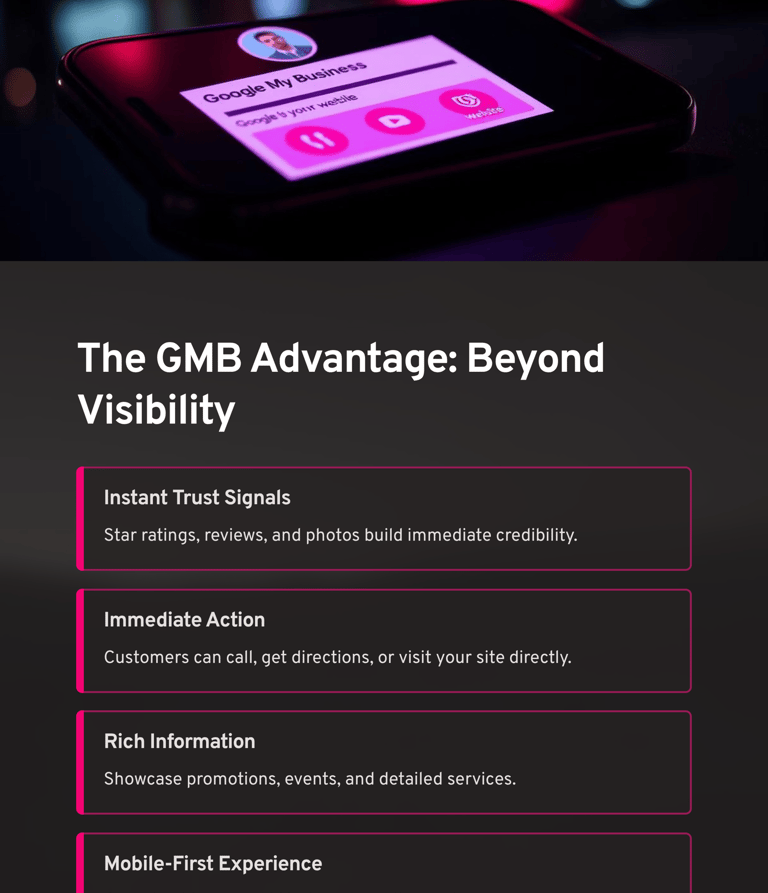

Future-Proofing Your GMB Strategy {#future-proofing-gmb-strategy}
Emerging Trends and Technologies
Voice Search Optimization
As voice search continues to grow, optimize your GMB profile for conversational queries:
Include natural language phrases in your business description
Optimize for question-based searches ("Where can I find...")
Focus on local context and immediate needs
Ensure your information is easily accessible to voice assistants
Artificial Intelligence Integration
AI-Enhanced Customer Experience:
Implement AI chatbots that integrate with your GMB messaging
Use AI for personalized customer communication
Leverage machine learning for optimal posting times and content
Automate review response suggestions while maintaining authenticity
Preparing for Algorithm Changes
Adaptability Framework
Google's local search algorithm continues to evolve. Build flexibility into your optimization strategy:
Core Principles That Remain Constant:
Focus on genuine customer value and satisfaction
Maintain accurate, consistent business information
Build authentic relationships with customers and community
Provide exceptional customer experiences worth talking about
Monitoring and Adaptation Systems:
Stay informed about Google My Business feature updates
Monitor local search ranking algorithm changes
Test new features and optimization opportunities quickly
Maintain agility in your local marketing approach
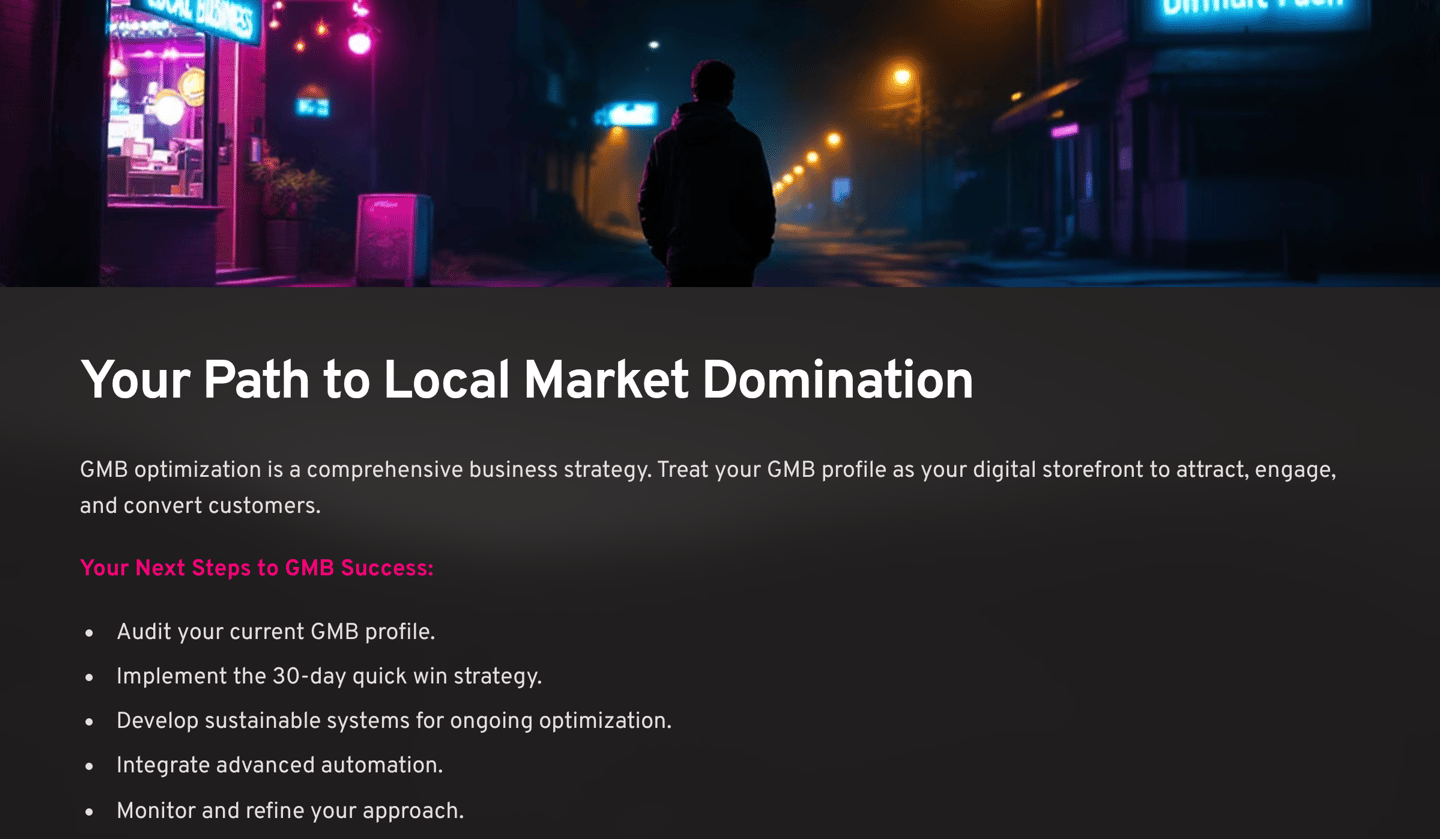

Implementation Roadmap and Action Plan {#implementation-roadmap}
30-Day Quick Win Strategy
Week 1: Foundation Audit and Optimization
Complete comprehensive GMB profile audit
Ensure NAP consistency across all platforms
Optimize business description and categories
Upload high-quality photos representing all business aspects
Week 2: Content and Engagement Setup
Create 30-day GMB posting calendar
Set up review generation and response systems
Populate Q&A section with strategic questions and answers
Implement customer communication workflows
Week 3: Integration and Automation
Connect GMB with website analytics and tracking
Set up automated monitoring and alerting systems
Integrate with existing CRM and customer service systems
Create performance measurement dashboards
Week 4: Testing and Refinement
Analyze initial performance data and customer responses
Test different content approaches and posting schedules
Refine automation systems based on early results
Plan long-term optimization strategy
90-Day Growth Acceleration Plan
Month 1: Optimization Foundation Focus on perfecting your GMB profile basics and establishing consistent performance measurement.
Month 2: Content and Community Building Develop robust content strategies and begin building stronger community connections through your GMB presence.
Month 3: Advanced Strategy Implementation Implement advanced features, automation systems, and competitive differentiation strategies.
Long-Term Success Framework
Quarterly Review and Optimization
Comprehensive performance analysis and competitor benchmarking
Strategy refinement based on data insights and market changes
New feature testing and implementation
Goal setting and strategy evolution for upcoming quarter
Annual Strategic Planning
Complete local market analysis and positioning assessment
Technology integration evaluation and upgrades
Competitive advantage development and enhancement
Long-term growth goal alignment and resource allocation
Advanced Local SEO Integration Strategies {#advanced-local-seo-integration}
Building Local Authority and Trust
Community Leadership Positioning
The most successful local businesses don't just serve their communities—they lead them. Your GMB optimization should reflect and amplify your role as a community leader and industry expert.
Authority Building Tactics:
Share insights about local market trends and industry developments
Participate in community events and document your involvement
Partner with other local businesses for mutual promotion
Contribute expert commentary on local business topics
Local Link Building Through GMB
Your GMB profile can serve as a catalyst for earning high-quality local backlinks:
Local media coverage of your business activities
Chamber of Commerce and business association listings
Community event sponsorships and partnerships
Guest content creation for local publications and blogs
Geographic Expansion Strategies
Multi-Location Management
For businesses serving multiple geographic areas, each location requires its own optimized GMB profile with location-specific optimization.
Location-Specific Optimization Elements:
Unique local phone numbers for each location
Location-specific photos and content
Local community involvement and partnerships
Area-specific service offerings or specializations
Local staff and management representation
Service Area Business Optimization
For businesses that travel to customers rather than operating from a fixed location, GMB optimization focuses on service area definition and customer convenience.
Service Area Best Practices:
Clearly define service areas without being overly broad
Hide your address if you don't serve customers at your business location
Focus on travel time and convenience in your messaging
Highlight mobile or on-site service capabilities
Use location-based keywords for areas you serve
Competitive Differentiation Strategies
Market Position Analysis
Understanding your competitive landscape is crucial for effective differentiation through your GMB profile.
Competitive Analysis Framework:
Identify direct and indirect competitors in your service area
Analyze their GMB optimization strategies and performance
Identify gaps in their service or communication approach
Develop unique value propositions that address market needs
Position your business to fill identified market gaps
Unique Value Proposition Communication
Your GMB profile should clearly communicate what makes your business different and better than alternatives.
Differentiation Strategies:
Highlight unique services or specializations others don't offer
Showcase superior customer service approaches
Demonstrate faster response times or availability
Feature exclusive partnerships or certifications
Emphasize local connections and community involvement
Customer Journey Optimization {#customer-journey-optimization}
Understanding Local Customer Behavior
The Modern Local Search Journey
Today's customers follow complex paths from initial awareness to final purchase. Understanding these journeys helps you optimize your GMB profile for maximum conversion impact.
Typical Customer Journey Stages:
Awareness: Customer realizes they need a solution Research: Customer searches for local options and compares businesses Evaluation: Customer reviews specific businesses and checks credentials Decision: Customer chooses a business and takes action Experience: Customer receives service and forms opinions Advocacy: Satisfied customers leave reviews and make referrals
GMB Optimization for Each Journey Stage
Awareness Stage Optimization
When customers first discover your business, they need quick answers about what you do and whether you can help them.
Awareness-Focused Elements:
Clear, benefit-focused business descriptions
High-quality photos that immediately communicate your value
Strategic category selection for maximum search visibility
Educational posts that address common customer problems
Research and Evaluation Support
During the research phase, customers are comparing multiple options and looking for reasons to choose your business.
Research Support Strategies:
Comprehensive photo galleries showing all aspects of your business
Detailed service descriptions in posts and Q&A responses
Customer testimonials and case study highlights
Transparent pricing information where appropriate
Decision-Making Facilitation
When customers are ready to choose, remove friction and make it easy for them to take action.
Conversion Optimization Elements:
Clear contact information and multiple communication options
Easy appointment scheduling or ordering processes
Immediate response capabilities through messaging or chatbots
Special offers or incentives for new customers
Post-Purchase Experience Enhancement
Customer Satisfaction and Retention
Your relationship with customers shouldn't end after the initial transaction. Use your GMB profile to enhance ongoing customer relationships.
Post-Purchase Strategies:
Follow-up content that adds value to their purchase
Loyalty program information and exclusive offers
New service announcements relevant to existing customers
Community events and customer appreciation activities
Crisis Management and Reputation Recovery {#crisis-management}
Handling Negative Situations
Crisis Response Protocol
Every business eventually faces negative feedback or challenging situations. How you handle these moments through your GMB profile can significantly impact your long-term reputation.
Immediate Response Framework: Acknowledge Quickly: Respond to negative reviews within 2-4 hours when possible Take Responsibility: Own any legitimate issues without making excuses Offer Solutions: Provide specific steps to address the customer's concerns Move Offline: Invite detailed discussions to private channels Follow Up: Ensure resolution and potentially invite updated reviews
Reputation Recovery Strategies
Proactive Reputation Building:
Increase positive review generation from satisfied customers
Create content that demonstrates your commitment to customer satisfaction
Showcase improvements and changes made based on feedback
Highlight your customer service approach and values
Long-Term Trust Rebuilding:
Consistently demonstrate improved customer experiences
Document and share your commitment to excellence
Build relationships with local influencers and community leaders
Focus on delivering exceptional value that generates organic positive feedback
Review Trend Management
Identifying and Addressing Patterns
Sometimes negative reviews reveal systematic issues that need addressing. Use review analysis to identify:
Recurring customer complaints or concerns
Service delivery gaps or communication issues
Staff training opportunities
Process improvements that could enhance customer experience
Positive Trend Amplification
When you identify positive trends in your reviews, amplify and leverage them:
Highlight commonly praised aspects of your business in your profile
Train staff to consistently deliver experiences that generate positive feedback
Create content and posts that reinforce your strongest value propositions
Use positive themes in your broader marketing messaging
Advanced Analytics and Performance Tracking {#advanced-analytics}
Comprehensive Performance Dashboard Creation
Multi-Platform Analytics Integration
Create comprehensive dashboards that track your GMB performance alongside other important business metrics:
Dashboard Components:
GMB search impressions and click-through rates
Website traffic from local search sources
Phone call volume and conversion rates from GMB
Review generation rates and sentiment analysis
Competitor performance benchmarking
Revenue attribution from local search activities
Custom Metric Development
Develop business-specific metrics that align with your unique goals and customer behavior:
Cost per acquisition from local search
Customer lifetime value by acquisition source
Local market share estimation based on search visibility
Seasonal trend analysis for optimization planning
Predictive Analytics Implementation
Trend Identification and Forecasting
Use historical data to predict future performance and optimize your strategies accordingly:
Predictive Insights:
Seasonal search volume fluctuations
Customer behavior pattern changes
Competitor activity predictions
Local market evolution trends
Resource Allocation Optimization
Use performance data to allocate your marketing resources more effectively:
Identify highest-ROI optimization activities
Determine optimal posting schedules and content types
Prioritize review generation efforts for maximum impact
Focus automation development on highest-value activities
International and Multi-Market Considerations {#international-considerations}
Global Business Local Optimization
Multi-Country GMB Management
For businesses operating in multiple countries, each market requires localized optimization approaches:
Country-Specific Considerations:
Local language optimization and cultural relevance
Country-specific Google My Business features and requirements
Local competition analysis and positioning strategies
Cultural communication preferences and customer expectations
Regional Search Behavior Differences
US Market Characteristics:
High mobile usage and voice search adoption
Strong preference for customer reviews and ratings
Emphasis on convenience and speed of service
Local competition intensity requiring strong differentiation
UK Market Considerations:
Different terminology preferences and local language variations
Unique seasonal patterns and holiday schedules
Local business directory preferences and citation opportunities
Cultural communication styles and customer service expectations
Australian Market Specifics:
Geographic distribution challenges and service area optimization
Local competition levels varying significantly by region
Unique seasonal patterns opposite to Northern Hemisphere
Local business culture and customer relationship preferences
Multi-Language Optimization Strategies
Language-Specific GMB Profiles
In diverse markets, consider creating separate GMB profiles for different languages or cultural communities:
Native language business descriptions and content
Culturally relevant photos and messaging
Community-specific events and partnerships
Language-appropriate customer service approaches
Technology Integration and Automation Excellence {#technology-integration}
AI-Powered GMB Management Systems
Intelligent Content Generation
Modern AI systems can help create compelling, relevant content for your GMB profile while maintaining authenticity and brand voice:
AI Content Applications:
Generate engaging post content based on business activities and seasons
Create compelling photo captions that include relevant keywords naturally
Develop personalized review responses that maintain consistency while feeling authentic
Generate Q&A content that addresses real customer needs and concerns
Smart Scheduling and Optimization
Automated Posting Optimization:
AI analysis of optimal posting times based on your audience behavior
Content performance prediction and automatic optimization
Seasonal content calendar generation with local event integration
Real-time content adjustment based on performance data
CRM and Customer Data Integration
Unified Customer Experience Management
Connect your GMB activities with your broader customer relationship management systems:
Integration Benefits:
Automatically update customer records with GMB interaction data
Trigger follow-up sequences based on GMB engagement
Personalize future communications based on GMB discovery paths
Track complete customer journeys from initial GMB discovery to long-term retention
Advanced Customer Segmentation
Use GMB data to create more sophisticated customer segments:
Customers who prefer phone contact versus website interaction
Geographic segments based on service area performance
Engagement level segments based on GMB interaction patterns
Service interest segments based on post engagement and queries
Marketing Automation Integration
Automated Lead Nurturing from GMB Sources
Create sophisticated nurturing sequences for customers who discover you through GMB:
Nurturing Sequence Components:
Welcome series for new customers who contact you through GMB
Educational content relevant to their initial search query
Social proof and case studies relevant to their business type or needs
Clear next steps and conversion opportunities
Long-term value-added content to maintain engagement
Cross-Platform Campaign Coordination
Coordinate your GMB activities with broader marketing campaigns:
Align GMB post content with email marketing themes
Synchronize social media content with GMB messaging
Coordinate promotional timing across all channels
Create consistent brand experiences regardless of customer entry point
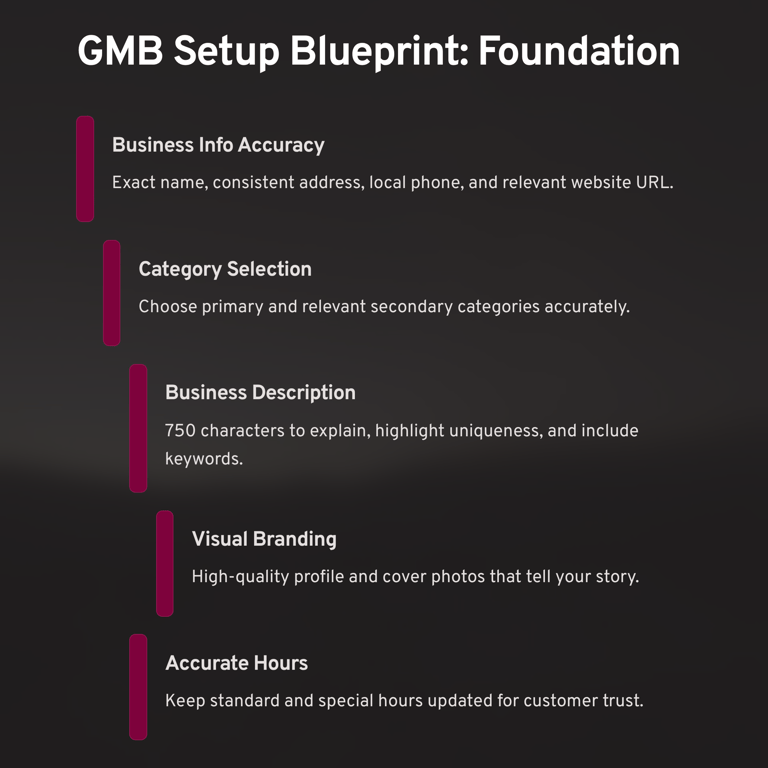

Legal and Compliance Considerations {#legal-compliance}
Privacy and Data Protection
Customer Information Handling
When managing customer interactions through GMB, maintain strict privacy standards:
Privacy Best Practices:
Never share customer personal information in public responses
Follow applicable data protection regulations (GDPR, CCPA, etc.)
Obtain explicit permission before featuring customers in photos or testimonials
Maintain secure systems for storing and managing customer communication data
Review Response Legal Considerations
Professional Response Guidelines:
Avoid making medical, legal, or professional claims in review responses
Don't discuss specific customer situations in public responses
Maintain professional language even when responding to unfair criticism
Consider legal consultation for responses to particularly serious allegations
Industry-Specific Compliance Requirements
Healthcare Provider Considerations
Healthcare businesses have unique compliance requirements for GMB optimization:
HIPAA compliance in all customer communications
Appropriate medical disclaimer language
Careful handling of patient testimonials and photos
Professional licensing and certification displays
Financial Services Compliance
Financial service providers must navigate additional regulatory requirements:
Appropriate disclaimers for financial advice or services
Compliance with financial advertising regulations
Professional licensing and registration displays
Clear fee and service structure communication
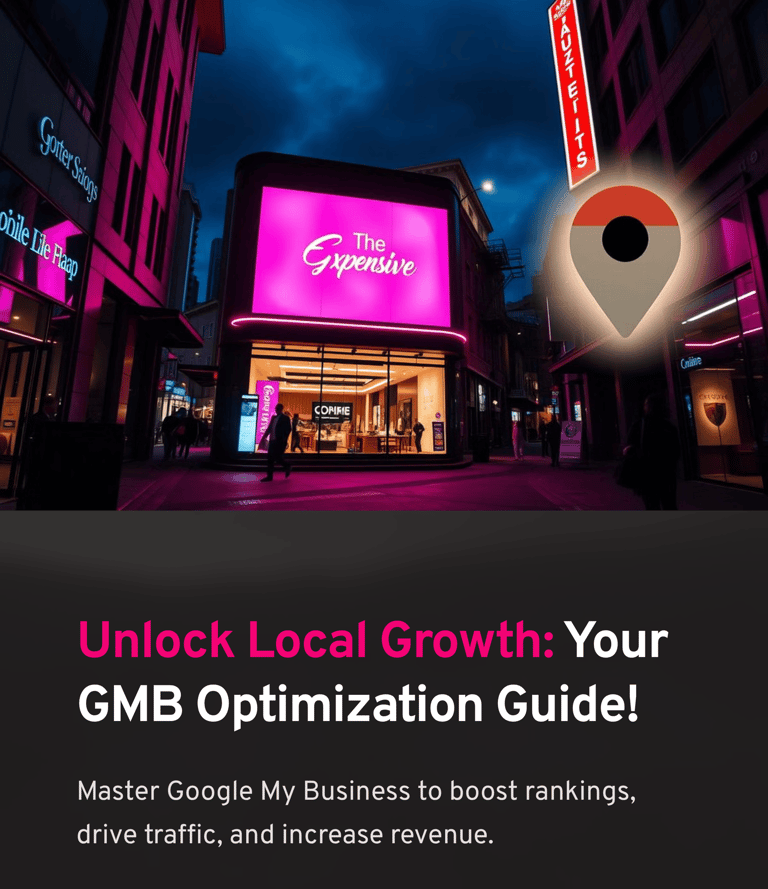

ROI Maximization and Business Growth {#roi-maximization}
Revenue Attribution and Tracking
Comprehensive Revenue Tracking Systems
Develop sophisticated systems for tracking revenue generated through GMB optimization efforts:
Attribution Methodologies:
Direct phone call tracking from GMB listings
Website conversion tracking for GMB-sourced traffic
In-store sales correlation with GMB optimization activities
Long-term customer value attribution from initial GMB discovery
Performance Benchmarking
Industry Benchmarks and Goals:
Compare your performance against industry standards and local competitors
Set realistic but ambitious goals based on your market position and opportunities
Track improvement trends over time rather than focusing solely on absolute numbers
Identify your unique performance advantages and optimize them further
Cost-Benefit Analysis Framework
Investment Optimization
Calculate the true cost and return of your GMB optimization efforts:
Cost Considerations:
Time investment for profile management and content creation
Photography and content creation expenses
Automation system setup and maintenance costs
Staff training and process development investments
Return Measurement:
Increased revenue from improved local visibility
Reduced customer acquisition costs through organic discovery
Enhanced customer lifetime value through improved first impressions
Operational efficiency gains from automated systems
Scaling Success Across Business Growth
Expansion Strategy Integration
As your business grows, your GMB strategy should evolve to support expansion:
Growth Phase Optimization:
Single location optimization and market domination
Multi-location expansion with consistent brand representation
Service area expansion with geographic optimization
Market leadership positioning through thought leadership content
Team Development and Training
Staff Training for GMB Success:
Customer service training that encourages positive reviews
Content creation skills for ongoing profile management
Crisis response training for handling negative feedback
Technology training for automation system usage
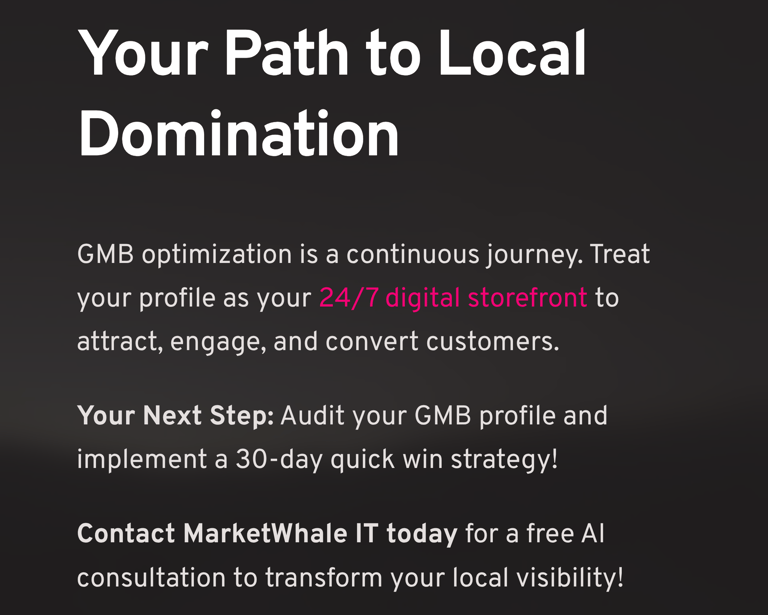

Conclusion: Your Path to Local Market Domination
Google My Business optimization isn't just another marketing task—it's a comprehensive business strategy that touches every aspect of customer acquisition, retention, and growth. The businesses that understand this and implement systematic, strategic approaches to GMB optimization consistently outperform their competitors.
The key to success lies in treating your GMB profile as what it truly is: your digital storefront, your reputation manager, and your customer service representative all working 24/7 to grow your business. When optimized correctly and integrated with modern automation systems, your GMB profile becomes a powerful revenue-generating asset that works continuously to attract, engage, and convert customers.
Your Next Steps to GMB Success:
Audit your current GMB profile using the comprehensive checklist provided in this guide
Implement the 30-day quick win strategy to see immediate improvements
Develop sustainable systems for ongoing optimization and customer engagement
Integrate advanced automation to maximize efficiency while maintaining authenticity
Monitor and refine your approach based on performance data and customer feedback
Remember, GMB optimization is an ongoing process, not a one-time project. The businesses that commit to continuous improvement and strategic enhancement consistently achieve the best results and maintain their competitive advantages over time.
The local search landscape will continue evolving, but the fundamental principles of providing exceptional customer value, maintaining accurate information, and building authentic relationships remain constant. Focus on these foundations while embracing new technologies and optimization opportunities as they emerge.
Your customers are searching for businesses like yours right now. With the strategies and techniques outlined in this guide, you can ensure they find you, choose you, and become advocates for your business. The only question remaining is: when will you begin implementing these strategies to transform your local market presence and drive sustainable business growth?
About MarketWhale IT: We specialize in AI-powered business automation and local marketing solutions that help business owners achieve measurable growth. Our comprehensive systems integrate GMB optimization with advanced automation technologies to maximize your local market presence while minimizing manual management time. Contact us today to discover how our proven strategies can transform your local business visibility and drive sustainable revenue growth.
The Complete Google for Local Business Guide: Transform Your Local Visibility and Drive More Customers Through Your Doors
The Complete Business Listing Management Guide: How Smart Business Owners Dominate Local Search
The Complete Guide to Online Reputation Management: How Business Owners Can Build, Monitor, and Protect Their Digital Brand
The Ultimate Review Generation Playbook: How Smart Business Owners Turn Every Customer Into a 5-Star Brand Ambassador in 2025
The Complete Business Owner's Guide to Google Reviews Optimization: Transform Your Online Reputation into a Revenue-Generating Machine
The Complete Google My Business Optimization Guide: How Smart Business Owners Transform Local Visibility into Revenue Growth
Centralized Review Management: The Complete Guide for Business Owners in 2025
The Ultimate Guide to Customer Experience Enhancement: Transform Your Business with AI-Powered Solutions
The Complete Guide to Website Chat Solutions: Transform Your Business Growth with AI-Powered Customer Engagement
The Complete Guide to Referral Marketing Campaigns: Turn Your Customers Into Your Biggest Sales Force
AI-Powered Social Media Management: The Complete Business Guide for Explosive Growth
The Complete Guide to Social Media Reviews: How Smart Businesses Turn Social Feedback into Revenue Growth
The Complete Business Owner's Guide to Centralized Customer Messaging: How to Transform Customer Communication and Boost Revenue by 300%
Services for Local Business Growth
AI Systems
AI solutions for businesses, automation, and marketing.
© 2025. All rights reserved.